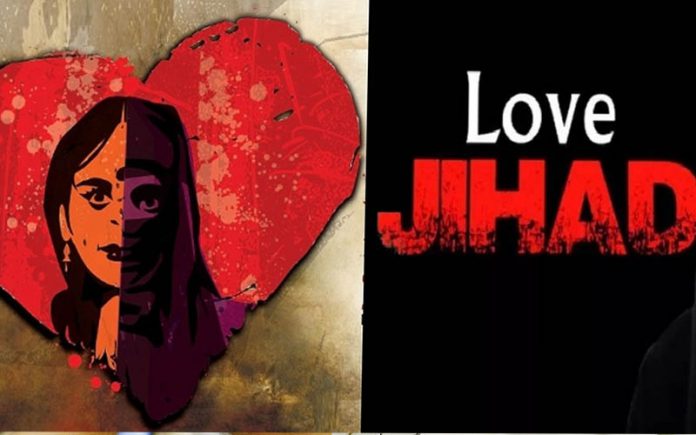
.png) Joseph Maliakan
Joseph Maliakan

The Prohibition of Unlawful Religious Conversion Ordinance 2020 singed in to law by Uttar Pradesh Governor Anandiben Patel on 28 November is bad in law and is riddled with serious contradictions which will not stand legal scrutiny.
While the term ‘love-jihad’ is not used in the Ordinance it is well-known that it has been promulgated basically to prevent it. There is no authoritative definition available for the term ‘love-jihad’. Also, there has been so far no evidence for the phenomenon which has been described by ‘people in the know’ as a well-planned operation by handsome Muslim youth to lure away young women from other communities to get married. And the purpose apparently is to increase the population of Muslims!
The phenomenon was first ‘noticed’ in Kerala, from there it migrated to Karnataka and slowly travelled to the North and arrived in Uttar Pradesh by the summer of 2014. There have been a number of complaints with the police as well as cases in the courts, including the Supreme Court of India, regarding love-jihad.
The National Investigation Agency (NIA) on the direction of the Supreme Court investigated the matter and concluded that there was no evidence for it. However, some state governments and certain sections of the people have no faith in the NIA and they ‘believe’ that love-jihad exists. After all, the government has to ‘honour’ the faith or rather the belief of the people.
First, the U.P. Ordinance makes conversion by marriage unlawful, cognizable and non-bailable so that anyone arrested under the new law is sure to spend several years in jail, even if he is found not guilty by a court of law at the end of the trial.
Under the Ordinance there are three categories of punishment and fine for unlawful conversion. Those found guilty of conversion by “misrepresentation, force, undue influence, coercion, allurement or by any other fraudulent means” ordinarily will face jail of one to five years and a minimum fine of Rs.15,000.
In case the conversion is of a minor, scheduled caste, scheduled tribe or a woman, the guilty will face a jail term of three to 10 years with a fine of Rs.25,000. And in case of mass conversions (conversion of more than two persons is mass conversion according to the Ordinance) the guilty will face jail term of three to 10 years and a fine of Rs.50,000.
Article 25(1) guarantees freedom of conscience and free profession, practice and propagation of religion: subject to public order, morality and health, to every citizen and not merely to the followers of one particular religion.
Section 2(1) of the UP Ordinance introduces a new character, “religious convertor” and creates room for harassing people on mere suspicion. Freedom of conscience under Article 25 is not confined to the right to adhere to one’s own religion but also to abandon one’s religion and adopt another according to the dictates of one’s judgment or conscience. The change may be done on one’s own volition or on the persuasion of another person so long as objectionable methods are not employed. Either way, it is a legitimate exercise of the right to freedom of conscience and by no stretch of imagination can be considered a criminal act.
For in Stanislaus v. State of M.P., (AIR 1977 SC908), the constitutionality of the M.P. and Odissa Acts was challenged on the ground that: (i) they violate the right to propagate one’s religion under Article 25 (1) and (ii) the State legislature lacked the legislative competence to enact such law as the matter of religion fell within the residuary Entry of List I. It was held by the Supreme Court that Article 25(1) by giving the right to propagate one’s religion does not grant the right to convert another person to one’s religion, but to transmit or spread one’s religion by ex
As to the legislative competence of the State Legislature it was pointed out that the right to freedom of religion is expressly made subject to public order, morality and public health. However, one fails to understand how inter-faith marriages affect public order. With the changing times thousands of inter-faith marriages take place in India every year. There have been so far no reports of any serious breach of public order from any part of the country on account of such marriages. In fact, in U.P after the promulgation of the Ordinance there have been attempts by certain sections of the people to disturb public order on account of inter-faith marriage.
The strangest provision in the new law is that it does not prohibit reconversion, even forcible reconversion. Section 3 of the law says “…if any person reconverts to his/her immediate previous religion, the same shall not be deemed to be conversion under this Ordinance.” Section 4 enables any person who is related to the one converting by blood, marriage or adoption to lodge a complaint. And section 9 says that the process of conversion will be complete only after the District Magistrate hears any objections the general public may have regarding conversion of an individual. The names of those converted will be displayed outside the office of the District Magistrate like the list of bad characters (BCs) displayed in police stations. Freedom of conscience and religion guaranteed by the Constitution has apparently no sanctity, according to the Ordinance.
Further, contrary to the time-tested practice in criminal law, the burden of proof to establish that a conversion is lawful lies on the person who has caused the conversion. The opinion of the person who has converted is immaterial. The law is primarily aimed at fixing the ‘convertor’. In all these, the police have been given unbridled power and therefore it is sure to be widely misused to harass the Muslims.
The text of the new law is nothing but a blatant attempt to legislate on a purely private issue like marriage and choice of one’s partner in life. It is nothing but violation of personal liberty. Many courts, in the recent past, have used strong words on the need to protect personal liberty as it is a fundamental right under Constitution.
Within days of the new law coming into force, cases have been filed in various places in Uttar Pradesh over inter-faith marriage and young men have been arrested. Some other BJP-ruled states too have threatened to enact laws in line with the U.P. Ordinance. It is going to be a test on both freedom of conscience and personal liberty in the largest democracy in the world.